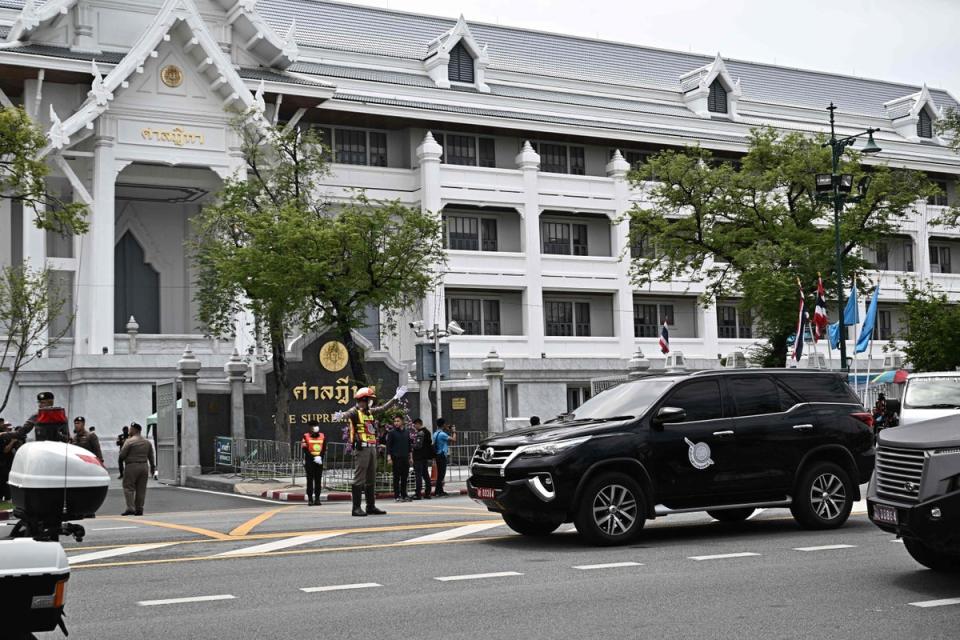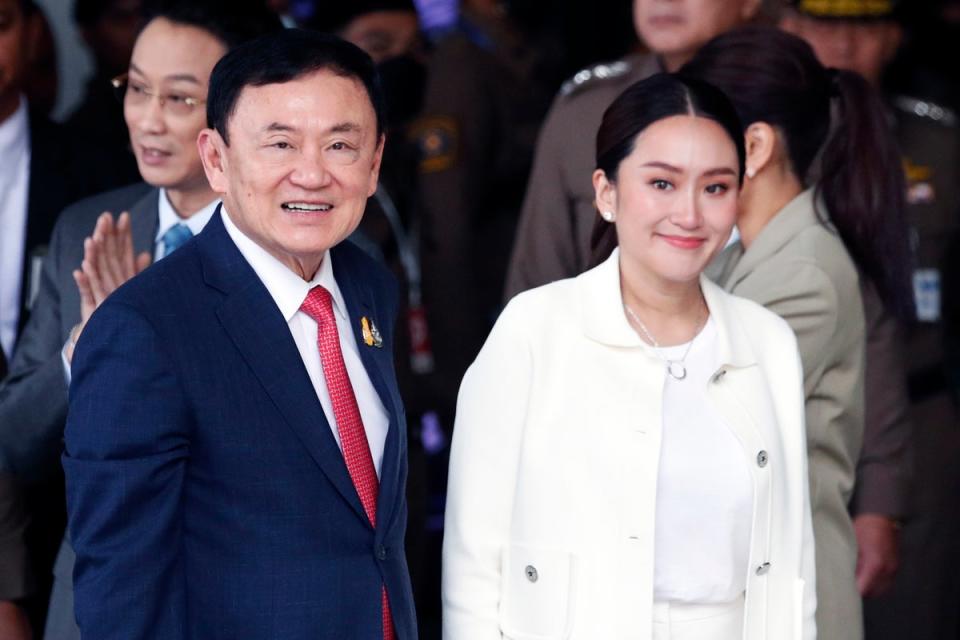Thailand’s ex-PM Shinawatra immediately arrested as he returns to country after 15-year exile
Thailand’s former prime minister Thaksin Shinawatra was immediately arrested and taken to court as he arrived in the country after more than 15 years in exile.
Mr Shinawatra’s arrival came hours before Thailand’s parliament approved the formation of a new coalition government led by the Pheu Thai party, which he founded back in 2007.
The telecoms tycoon set foot in Bangkok after flying in on a private jet from Singapore on Tuesday morning despite the possibility of his arrest for outstanding criminal charges.
Wearing a black suit, red tie and yellow lapel pin bearing a royal insignia, he was briefly greeted by his family members at Bangkok’s Don Mueang airport as he smiled and waved at hundreds of people who had gathered there to welcome him, before returning to the terminal.
The police had said Mr Shinawatra would be arrested and taken directly to the Supreme Court for a hearing, before being transferred to a prison.
He was handed an eight-year prison term, according to a statement by the Supreme Court, covering three different cases for abuse of power and malfeasance, illegally ordering a state-run bank to issue a foreign loan, and illegally holding shares via nominees.
Later the same day, the lower house of parliament and the military-appointed senate convened to vote on prime ministerial candidate Srettha Thavisin, a real estate tycoon who recently entered the political arena through the efforts of the Pheu Thai party, despite having joined politics only a few months ago.

A caretaker government has run Thailand since March as its new parliament remained in a political deadlock for weeks after the anti-establishment winner of May’s election, Move Forward, was blocked by conservative lawmakers.
Having emerged victorious in five elections during the last 20 years, Pheu Thai, established by the Shinawatra family, has now returned to power with the support of some controversial coalition partners.
The 11-party coalition includes two military-backed groups that orchestrated coups in 2006 and 2014, toppling governments led by Mr Shinawatra and his sister Yingluck Shinawatra.
Several in Thailand believed that Pheu Thai’s alliance with its old rivals in the military and the establishment is part of a behind-the-scenes deal to allow his return to the country, though this is something the party has denied.
Mr Srettha said Pheu Thai had no choice but to partner with some of its rivals that it had earlier vowed not to work with.

“We are not lying to the people, but we have to be realistic,” said Mr Srettha said on Monday.
His victory, with 482 votes out of 727, ends months of suspense and legal wrangling that followed the May elections.
In 2008, Mr Shinawatra went into exile in order to evade a prison term related to abuse of power. It came two years after he was ousted by the military on grounds of alleged corruption and perceived disloyalty to the monarchy. Mr Shinawatra strongly denied these accusations.
Confirming his arrival, Mr Shinawatra’s daughter, Paetongtarn Shinawatra, posted images on Facebook of a smiling father with his family, including seven grandchildren.
“Dad has returned to Thailand and has entered the legal process,” she said.

Mr Shinawatra is a highly polarising figure with both admirers and critics in Thailand. The former police officer, telecoms tycoon and English Premier League football club owner enjoys support of millions of working-class citizens through populist gestures of distributing cash, providing village loans, offering farm subsidies, and establishing universal healthcare.
But he and Pheu Thai have been heavily criticised by some in the country for going back on a pre-election pledge not to join hands with pro-military parties, and there are those who see the formation of the new government – excluding the May election’s biggest vote-winners and including parties aligned to the outgoing military junta – as a betrayal of the democratic process.
However, Pheu Thai officials have defended the pragmatism involved in the coalition talks, calling it a necessary step to break the political impasse and seek reconciliation after decades of deep political divisions.


